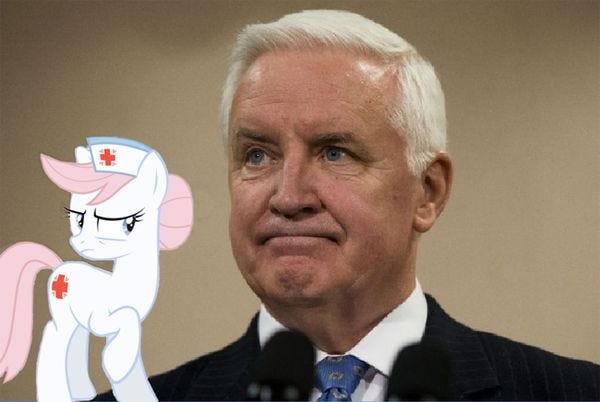Pennsylvania Gov Corbett Accepts Filthy Obamacare, Nation Weeps For Lost Innocence
After a year of negotiations, Pennsylvania has gotten federal approval for its alternative to Medicaid expansion, which will insure about 600,000 low-income Pennsylvanians through payments to private insurers. The benefits will be stingier than the federal Medicaid program, and will add some extra bureaucracy, but Republican Gov. Tom Corbett gets to call it market-based and not quite Obamacare, exactly, so that's a pretty fair trade-off for delaying insurance for poor people for over a year.
In what was described as a five-year demonstration project, Pennsylvania got the go-ahead to use federal money to pay private insurers to provide health care to uninsured individuals - many in low-wage jobs.
The Obama administration praised Pennsylvania for joining other states that opted into the program under the Affordable Care Act. Corbett administration officials called the agreement a successful compromise.
Also, it's entirely possible that the "Healthy PA" program may be replaced by Medicaid anyway, since Corbett is currently running behind in the polls against Democratic challenger Tom Wolf, who would rather accept an expansion of actual Medicaid for Pennsylvania.
Corbett's office released a statement emphasizing that the program was home-grown and therefor better than bad old Medicaid:
From the beginning, I said we needed a plan that was created in Pennsylvania for Pennsylvania, a plan that would allow us to reform a financially unsustainable Medicaid program and increase access to health care for eligible individuals through the private market.
Many of the most punitive parts of Corbett's plan, like work-search requirements and monthly premiums for people who already can't afford insurance, as well as paying for the plan by cutting other existing state health programs, were dropped as the state negotiated with the federal government. The plan that was approved will still include premiums for individuals who live above the poverty level (a princely annual income of $11,670), but they'll be capped at 2 percent of household income and won't go into effect until 2016. And those who don't pay the premiums could lose their coverage. Gotta make sure that the poors don't have it too cushy, with their color TVs and their refrigerators and their fancy indoor plumbing. The compromise plan at least added premium reductions for participants who get annual physicals, and the job search proposal morphed into a premium reduction for people who participate in job training or work search programs.
Joan Alker, a health policy expert and executive director of the Georgetown University Center for Families and Children, said she was pleased that hundreds of thousands stood to receive coverage and that punitive measures were dropped. But she said the plan imposes rules that add layers of bureaucracy while potentially reducing coverage in some areas.
"The governor clearly compromised on many of his original goals and requests. On the other hand, the rules are complicated," said Alker, a critic of Corbett's proposal, adding that Pennsylvania would have "the stingiest benefit packages."
So hooray for Pennsylvania, which managed to delay Medicaid expansion, and ended up with an alternative program that will send public funds to insurance companies, provide lower benefits, and be more difficult to access than real Medicaid. But thank god, Pennsylvania Republicans will at least be able to say they didn't knuckle under to the tyranny of Obamacare.
[ Philly.com ]




Some of them are, because the stupid are always with us.
Because it's a day ending in "y".